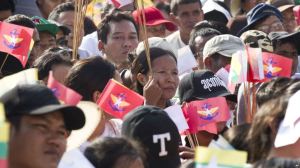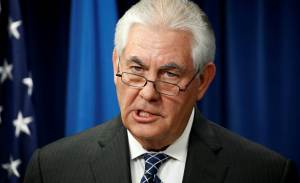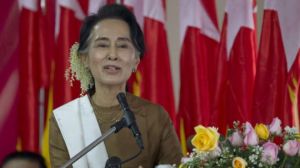Christof Lehmann (nsnbc) : Several thousand people marched in the streets of Yangon on Sunday to express their support for Myanmar’s military and to rebut international criticism and allegations that the military was biased and used disproportionate violence against Rohingya after a militant Rohingya attack in August sparked inter-communal violence and forced security forces to intervene.
 During and following the events in August reports were circulated claiming that the events had caused the exodus of more than 600,000 Rohingya refugees from Myanmar’s Rakhine State to Bangladesh, mainly Cox’s Bazar. Independent observers noted that the figures were grossly exaggerated and so were media reports alleging massacres, mass rapes, and so forth, often using images from other events.
During and following the events in August reports were circulated claiming that the events had caused the exodus of more than 600,000 Rohingya refugees from Myanmar’s Rakhine State to Bangladesh, mainly Cox’s Bazar. Independent observers noted that the figures were grossly exaggerated and so were media reports alleging massacres, mass rapes, and so forth, often using images from other events.
On Sunday, demonstrators, responded to the framing of Myanmar, its government and security forces by taking to the street to express their support for the military and to denounce “fake news” and unfounded, exaggerated allegations and accusations by foreign governments. Demonstrators included army supporters, Buddhist nationalists and monks, and “ordinary average citizens” who don’t want to see their country railroaded into a provoked crisis.
Earlier this month, U.S. Secretary of State Rex Tillerson joined the club of those who attempted to position Myanmar as rogue state when he said he holds the military leadership in Myanmar responsible for the current refugee crisis affecting the country’s Rohingya Muslim population. This week, Tillerson, in a phone call with Myanmar’s Armed Forces Commander-in-Chief, Senior General Min Aung Hlaing, expressed concern about the growing humanitarian crisis.
He urged Myanmar’s military to facilitate humanitarian aid for people in affected areas, to allow media access, and to cooperate with the U.N. “to ensure a thorough, independent investigation into all allegations of human rights abuses and violations and to ensure accountability,” State Department spokesperson Heather Nauert said.
Foreign powers behind violence – Tillerson’s mysterious blind spot
Many independent observers are wondering why U.S. Secretary of State Rex Tillerson and other top diplomats would make apparently unreflected and strongly biased statements while omitting that toreign powers, including Bangladesh, foreign terrorist organizations including Harakah al-Yaqin, Harukat-ul-Jihad-ul-Islam, Afghanistan’s Taliban and other foreign-backed Islamist organizations are fueling the ethnic and religious violence in Myanmar, in part with help from Bangladesh, Saudi Arabia and other foreign state and non-state actors.
In early September even Afghanistan’s Hezb-e-Islami party led by Gulbuddin Hekmatyar who is “no stranger to terrorism and intelligence on terrorist networks” slammed Islamist terrorist organizations including Afghanistan’s Taliban for fueling the violence between Buddhists and Muslim Rohingya in Myanmar in recent years. The party stressed that Islamist extremism forced Buddhists into taking action to defend themselves, thus fueling the eruption of the violence.
However, there are other – less tainted and controversial sources documenting the involvement of foreign-backed Islamist terrorist organizations as well as neighboring Bangladesh and its military intelligence service.
Intelligence reports from 2012, reviewed by this author, showed that violence in Myanmar’s Rakhine State, supposedly between Muslim Rohingya and Buddhists, has been planned and executed in collusion between the Al-Qaeda associated Harkat-ul-Jihad-al-Islam (HuJI) and the George Soros funded Rohingya Solidarity Organization. The basis of operations for these organizations and for the violence are Rohingya camps in Bangladesh. Both organizations as well as the camps are under supervision of Bangladesh´s intelligence service, DGFI.
Later intelligence reports reviewed by nsnbc international in January 2017 substantiate that this trend has continued and now increasingly involved a group that designates itself as Harakah al-Yaqin (a.k.a. Faith Movement, HaY). In fact, nsnbc international, in January 2017, warned that Islamists are opening new fronts in India and Myanmar.
Links between the DGFI and Pakistan’s ISI as well as Saudi intelligence have been reported. The HaY is led by the committee of Rohingya in Saudi Arabia and its commanders on the ground are Rohingya from Myanmar’s Rakhine State as well as from Rohingya refugee centers in Bangladesh.
It must be stressed that there is a significant amount of “internally displaced” Rohingya in Bangladesh and that most of the Rohingya who have come to Myanmar in recent decades fled oppression and internal displacement in Bangladesh. It is also noteworthy that a retired DGFI officer, in 2012, stressed to nsnbc that recruitment in Rohingya camps in Bangladesh is conducted under supervision of the DGFI.
The emergence of the HaY bears all the hallmarks of being extraordinarily well-organized and well-funded. The development comes as Myanmar’s new government attempts to find a political footing based on national coherence, national sovereignty, and an independent geopolitical position that takes into account, both Myanmar’s proximity to neighboring China and the energy-political and geostrategic interests of India, China and western corporate cartels who are interested in the country’s hydrocarbons. Myanmar’s Rakhine State is the most resource-rich area in the greater Mekong region.
Myanmar targeted with misinformation: Suu-kyi
Aung San Suu-Kyi, Myanmar’s State Councilor and de-facto head of State responded to UN-led calls in August and September for her government to end violence against Rohingya stressing that the violence between predominantly Muslim Rohingya and majority Buddhists is fueled by “a huge iceberg of misinformation”.
Suu-kyi also stressed that both Myanmar and the international community should rather focus on the many communities with Rohingya in Myanmar where there hadn’t been any violence, and to identify what distinguishes those communities from the ones where there have been problems with violence.
Violence in Myanmar’s Rakhine State prompted about 125,000 (not 600,000) predominantly Muslim Rohingya to flee to Bangladesh. The situation caused global outrage, however, without considering the fact that foreign-backed Islamist insurgents provoked the violence, and the fact that many of the Rohingya in Myanmar are first, second and third generation refugees who were displaced because of ethnic cleansing in Bangladesh.
The most recent round of violence was sparked when Islamist Rohingya militants, on August 25, launched a series of deadly ambushes, causing a crackdown by security forces and renewed inter-communal violence. Suu Kyi’s government has faced growing international condemnation for the army’s response with refugees bringing with them renewed stories of murder, rape and burned villages at the hands of soldiers. Many of these claims are being “reported” by media without appropriate vetting and reports are highly politicized.
In early September, in her first public comment since August 25, Aung San Suu-kyi said there was a huge iceberg of misinformation designed to create a lot of problems between different communities and with the aim of promoting the interests of the terrorists. The statement was made following a call from Turkey’s President R. Tayyip Erdogan who is not only particularly critical of the government of Myanmar, but who is also known for decades of support of Islamist insurgencies including Afghanistan’s Taliban, and a variety of Al-Qaeda affiliates and offshoots, including Jabhat al-Nusra in Syria.
Erdogan – no stranger to State-sponsored terrorism and ethnic cleansing of Kurds – went as far as dubbing the crackdown against insurgents and militant Rohingya as a “genocide”. Ironic then, that , even Erdogan’s Afghani -now reformed – former terrorist friend Gulbuddin Hekmatyar and his Hezb-e-Islami didn’t blast the Burmese government and Suu-kyi and instead slammed Islamist terrorist organizations including Afghanistan’s Taliban for fueling the violence between Buddhists and Muslim Rohingya in Myanmar in recent years.
CH/L – nsnbc 30.10.2017
Source Article from https://nsnbc.me/2017/10/30/thousands-in-myanmar-march-in-support-of-military-tillersons-blind-spot-and-islamist-insurgents/
 RSS Feed
RSS Feed















 October 30th, 2017
October 30th, 2017  Awake Goy
Awake Goy 












 Posted in
Posted in  Tags:
Tags: 













